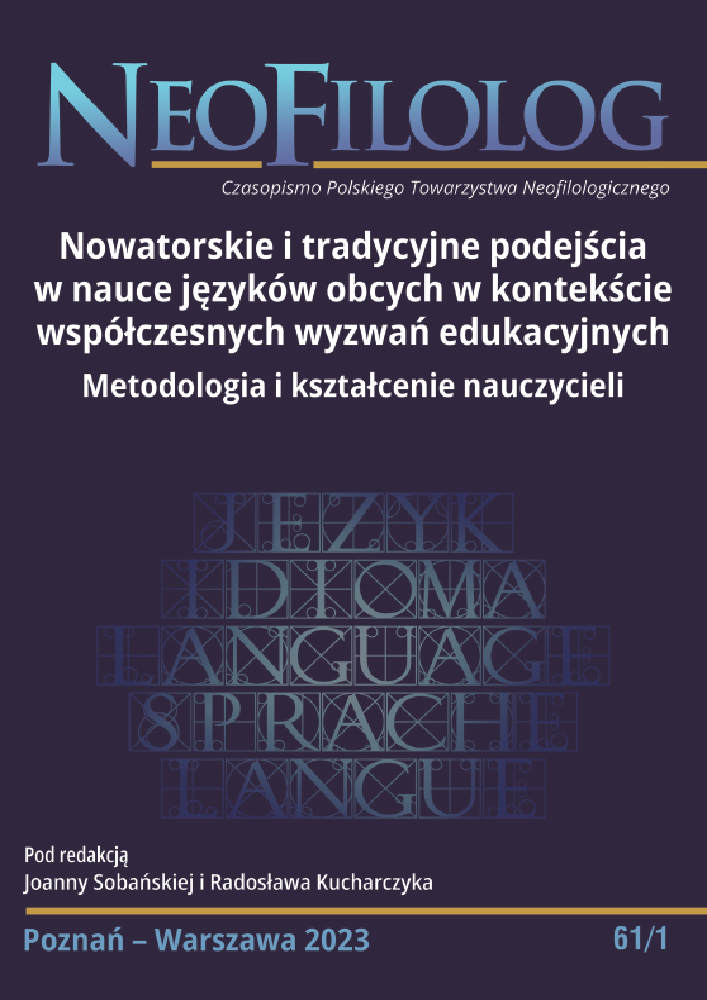Abstract
The practicum is an important part of the training of prospective foreign language teachers. The reflections proposed in this article deal with the assumptions of mentoring when confronted with its practical implementation, with a particular focus on learning through mentoring dialogues. The text provides an overview of the main models of mentoring in order to show the complexity of the tasks faced by the mentor teacher. Characteristics of the mentoring dialogue are also presented. This theoretical base is referred to in the study, which consisted of a qualitative analysis of mentoring dialogues and comments made afterwards by prospective teachers of French as a foreign language. The aim of the study was to identify the supervisory style, dialogue activity and mentoring roles performed by the mentor teachers. The analysis was also intended to show what kind of mentoring behavior is expected by the pre-service students. The findings show that the majority of mentor teachers dominate the conversation and prefer a directive supervisory style, which seems to meet the trainees’ expectations and needs. The pre-service students emphasize the importance of mentoring dialogues as a learning opportunity, and appreciate constructive criticism, positive reinforcement and concrete guidance on how to teach. The implication of the findings is discussed at the end.
References
Altet M. i in. (red.) (2013), Former des enseignants réflexifs. Obstacles et résistances. Louvain-la-Neuve: De Boeck Supérieur.
Chaliès S. (2016), Activités typiques et dilemmes des formateurs d’enseignants, (w:) Lussi Borer V., Ria L. (red.), Apprendre à enseigner. Paris: Presses Universitaires de France, s. 221–232. DOI: https://doi.org/10.3917/puf.borer.2016.01.0221
Colognesi S., Deprit A., Van Nieuwenhoven C. (2021), Cinq balises pour assurer l’accompagnement des étudiants, (w:) Raucent B. i in. (red.), Accompagner les étudiants. Rôles de l’enseignant, dispositifs et mises en œuvre. (2e édition revue et augmentée). Louvain-la-Neuve : De Boeck Supérieur, s. 70–86. DOI: https://doi.org/10.3917/dbu.rauce.2021.01.0069
Elsner D., Taraszkiewicz M. (2002), Opiekun stażu jako refleksyjny praktyk. Chorzów: Wydawnictwo Gnome.
Hennissen P. i in. (2008), Mapping mentor teachers’ roles in mentoring dialogues, „Educational Research Review”, nr 3 (2008), s. 168–186. Online: https://doi.org/10.1016/j.edurev.2008.01.001 [DW 10.09.2022]. DOI: https://doi.org/10.1016/j.edurev.2008.01.001
Hennissen P. i in. (2011), Clarifying pre-service teacher perceptions of mentor teachers’ developing use of mentoring skills, „Teaching and Teacher Education”, nr 27, s. 1049–1058. Online: http://dx.doi.org/10.1016/j.tate.2011.03.009 [DW 10.06.2022]. DOI: https://doi.org/10.1016/j.tate.2011.03.009
Kourieos S. (2019), Problematising School-Based Mentoring for Pre-Service Primary English language Teachers, „Mentoring and Tutoring: Partnership in Learning”, June 2019, s. 1–23. Online: https://doi.org/10.1080/13611267.2019.1630992 [DW 09.05.2023] DOI: https://doi.org/10.1080/13611267.2019.1630992
Lejonberg E. i in. (2018), Mentors of preservice teachers: The relationships between mentoring approach, self-efficacy and effort, „International Journal of Mentoring and Coaching in Education”, vol. 7, nr 3, s. 261–279. Online: https://doi.org/10.1108/IJMCE-12-2017-0076 [DW 12.09.2022]. DOI: https://doi.org/10.1108/IJMCE-12-2017-0076
Liu S.-H. (2014), Excellent Mentor Teachers’ Skills in Mentoring for Pre-Service Teachers, „International Journal of Education”, vol. 6, nr 3, s. 29–42. Online: http://dx.doi.org/10.5296/ije.v6i3.5855 [DW 15.06.2022]. DOI: https://doi.org/10.5296/ije.v6i3.5855
Orland-Barak L., Wang J. (2021), Teacher Mentoring in Service of Preservice Teachers’ Learning to Teach: Conceptual Bases, Characteristics, and Challenges for Teacher Education Reform, „Journal of Teacher Education”, vol. 72(1), s. 86–99. Online: https://10.1177/0022487119894230journals.sagepub.com/home/jte [DW 19.06.2022]. DOI: https://doi.org/10.1177/0022487119894230
Paquay L. i in. (red.) (2012/2015), Former des enseignants professionnels. Quelles stratégies? Quelles compétences? Louvain-La-Neuve: De Boeck Supérieur.
Raucent B. i in. (red.) (2021), Accompagner les étudiants. Rôles de l’enseignant, dispositifs et mises en œuvre. (2e édition revue et augmentée). Louvain-la-Neuve : De Boeck Supérieur. DOI: https://doi.org/10.3917/dbu.rauce.2021.01
Szymankiewicz K. (2017), Przyszli nauczyciele języków obcych na drodze budowania kompetencji zawodowej. Refleksja – Uczenie się – Rozwój. Warszawa – Lublin: Instytut Romanistyki – Werset.
Vacher Y. (2015), Construire une pratique réflexive. Comprendre et agir. Louvain-La-Neuve: De Boeck Supérieur. DOI: https://doi.org/10.3917/dbu.vachr.2015.01
Wati M. (2020), The Impact of Individual Student Mentoring for Teacher Professionalism in English Pre-Service Teacher Education. „Saga”, vol. 1, nr 2, s. 95–107. Online: https://doi.org/10.21460/saga.2020.12.47 [DW 20.06.2022]. DOI: https://doi.org/10.21460/saga.2020.12.47
License
Copyright (c) 2023 Krystyna Szymankiewicz

This work is licensed under a Creative Commons Attribution-NoDerivatives 4.0 International License.
Authors
Authors of texts accepted for publication in Neofilolog are required to complete, sign and return to the Editorial team’s office the Agreement for granting a royalty-free license to works with a commitment to grant a CC sub-license.
Under the agreement, the authors of the texts published in Neofilolog grant Adam Mickiewicz University in Poznań a non-exclusive, royalty-free license and authorize the use of Attribution-NoDerivatives 4.0 International (CC BY-ND 4.0) Creative Commons sub-license.
The authors retain the right to the free disposal of the work.
Users
Interested Internet users are entitled to use works that have been published in Neofilolog since 2017, under the following conditions:
▪ attribution – obligation to provide, together with the distributed work, information about the authorship, title, source (link to the original work, DOI) and the license itself.
▪ no derivatives – the work must be preserved in its original form. Without the author's consent, it is not possible to distribute the modified work in the form of translations, publications, etc.
Copyrights are reserved for all texts published since 2017.
Miscellaneous
Adam Mickiewicz University in Poznań retains the property right as a whole (layout, graphic form, title, cover design, logo etc.).

